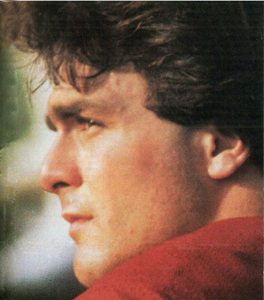Doug Flutie Loses Both Parents Within an Hour of Each Other
Doug Flutie, one of the most famous athletes to come from New England, has always credited his parents, Richard and Joan, with giving him the support and confidence to excel, no matter the obstacles. On Wednesday, November 18, 2015, Flutie’s father passed away from a heart attack after a period of poor health. An hour […]

Coffee By Design | Portland, Maine
Photo Credit : Katherine Keenan
Photo Credit : Dick Flutie
The father of Doug Flutie drives slowly through Natick, a town of 31,000 west of Boston. It is a summer night; the air conditioner hums softly. Now and then the radar detector beeps a warning, but Dick Flutie pays it little heed. His wife Joan sits in the back.
They are showing me landmarks in the life of their son, Doug Flutie — the most famous football player in New England history — so he drives as if these streets were pages from an album he could turn.“That’s where Doug and Laurie were married,” Dick says in front of St. Patrick’s Church. LIFE magazine was there. “Natick’s royal couple,” I say. “Yes,” Dick says, “they were.” Four years have passed since the wedding, a new granddaughter has been born, but he still has trouble accepting that Doug has a life away from them, even though the life is lived but two miles away. “That’s been the hardest,” he says. “Not the football. Just Doug not being around as much.”
We ride in a 1985 Ford LTD Crown Victoria. It is maroon, the school color of Boston College, Doug’s alma mater. In the winter of that year, at the height of his fame, Doug made a television commercial for Ford; as payment he could select a car. He told his father to take his pick. “I was in a grocery store with Doug,” Dick says, “and I felt tears in my eyes. I pulled him over in an aisle, and I told him that for me not to have to worry about car payments … well, nobody had ever given me anything like that. Ever.” Bolted to the front bumper is a Boston College novelty plate, presumably in place forever. Lying on the back window is a New England Patriots banner that — should Doug be traded — can easily be removed.
Five years ago Doug Flutie threw a ball that traveled 65 yards through the rain in the twilight of the Orange Bowl, defying a wind that shook the palms outside the stadium and a clock that read zero. Some 30 million people watched on national television. The longest pass in football history, one writer said, because it traveled into myth. When he threw the ball, the score was 45-41 in favor of the University of Miami, the defending national champions. When the ball came down, Gerard Phelan, Doug’s roommate, was waiting two yards deep in the end zone. Later, in the bedlam of the Boston College locker room, a player said, “That wasn’t Gerard Phelan who caught the ball. God caught that ball.” “No,” replied a teammate, “God threw it.”
The land hungered for a hero. Here was Doug Flutie: clean living, handsome, polite, modest; a Rhodes Scholar candidate who played with the bravado of a fighter pilot. He said his parents were his best friends. He played touch football with his old neighborhood pals. And his story read as if scripted in Hollywood. Standing a shade under 5′ 10″ and only 165 pounds, he was too small for big-time college football. Though time and again he had rescued his Natick High team from certain defeat, the Boston College coach had rejected him. Then the coach resigned. A new coach, Jack Bicknell, arrived from Maine. Dick Flutie phoned him . “Take another look at Doug,” he urged. “Look at the films.” There was one scholarship left to offer, and his son received it. When Bicknell came to the house, Dick told him, “You don’t know what you have just signed. You just don’t know.”
Doug became what the New York Times called “a cultural icon.” Stores sold out of football shirts bearing number 22. A week after the “miracle in Miami” he won the Heisman Trophy, awarded to college football’s best player, and soon after helped Boston College win the Cotton Bowl. A television producer toured New York with him and said in wonder, “It was like being with Sinatra.” One day former president Richard Nixon was walking when a young woman wearing a Boston College sweatshirt jogged by. “Ah,” he reportedly murmured, “Doug Flutie.”
For years Dick Flutie had been Doug’s coach, his cheerleader, his historian; he roamed the playing fields snapping photos of his three boys, athletes all, and sold them to the local papers for $5 a shot. A computer engineer, he arranged work schedules so he could attend practices. Once Doug’s high school baseball coach told him not to come to practices anymore. The two men have not spoken since. At Boston College he obtained a photographer’s sideline pass. At times during games he could almost reach out and touch his son.
His own father, the son of a Lebanese immigrant, had been an oft-injured 5’6″ lineman in high school and college. Dick grew up lonely in Baltimore without brothers, with an alcoholic stepmother and a father who seldom made time for play. He never forgot his ineptness when he tried out for Little League against the boys whose fathers had helped them along. When his father refused to let him play football, he cried himself to sleep and joined the golf team. As soon as he graduated from high school, he married Joan Rhodes, his girlfriend across the alley.
The children came, one after the other — Denise, then Bill, then Doug, then Darren. Dick worked days, went to college at night, formed a dance band, moved to Florida, gave his kids music lessons, and dreamed of the day he would have a family band. They had no other family in Florida as, later, they would have no other family in Massachusetts. “All we ever had was each other,” said Joan. “We depended on each other. ” One day Bill said he wanted to play Little League. Dick signed permission and said he would help out. A few days later the coach quit and Dick, with little baseball knowledge, filled in. He went to the library and started reading. Baseball became football became basketball. The boys measured themselves against each other. Bill was the biggest, the fastest. Darren was the toughest. Doug was the most exciting. “Bill made all the plays,” remembered Joan, “but Doug was so much fun to watch.”
Joan joined in, coaching softball, girls’ basketball, running the concession stand at the games. “I learned about sports the same way I learned mothering. It’s there to do, and you just do it.”
Dick taught his sons a game called spoons. “You have a card table. You put one spoon in the middle. A person says ‘Ready … go!’ The first person who can grab the spoon and bring it back wins.”
“The furniture gets broken,” Joan said.
“It’s a good way to improve hand speed,” Dick said.
“I don’t know. It sure broke a lot of furniture,” Joan repeated.
On this night we pass the barbershop, the library, the town square. On a winter’s day in 1985 Doug rode down these streets in an open Thunderbird convertible, Dick and Joan in a convertible up ahead, waving to 50,000 people who ignored the cold to celebrate Doug Flutie Day. “The greatest parade this town’s ever seen,” said the police chief. As they rode, loudspeakers on the sidewalk blared again the football announcer’s frenzied shouts from November 23, 1984. “He did it! He did it! Flutie did it! He got Phelan in the end zone! Touchdown! Touchdown! Touchdown Boston College! No time on the clock! It is over! It is over!”
Soon in Natick there was a road called Flutie Pass. The youth football championship game was called the Flutie Bowl. People came to Dick and said, “You must be so proud of Doug.”
“I’m proud of all my children,” he replied. “Doug is proud to be a member of our family. The good times come and go,” he said, “but the family is forever.”
In February 1985 Doug signed to play for Donald Trump’s New Jersey Generals of the United States Football League (USFL). He became wealthy. Said Doug: “It almost seems like I have had too many good things happen to me.”
A rival quarterback simply said, “Sooner or later, the miracles will pass him by.”
Dick drives a few minutes out of town and stops in front of an expanded Cape, their former house in a neighborhood of modest, attractive homes where Wilogreen and Murdock roads converge. ” You’re sitting on Doug Flutie’s playground,” he says. “That was our dining room,” Joan says, “that bay window. We’d sit there and watch them play.”
They found the house in the spring of 1976 when they moved from Florida. Dick thought the schools would be better in New England. And, Joan explained, “the father of the high school quarterback in Florida gave lots of money to the school. Dick didn’t think money should decide who played.” A Boston friend suggested Framingham. On their drive north — four kids and a dog packed into the backseat — they turned off the Mass Pike and stopped at a McDonald’s in Natick. Dick asked some patrons which town had the best sports teams. “Natick,” they replied. He hustled the family to the local newspaper. A realtor saw him scanning the real estate pages and took them to Wilogreen Road, their suitcases still in the trunk; only hours after arriving in town, they bought the house. The Natick Babe Ruth league told Dick the teams had already been selected. Dick told them if he could have Bill and Doug he’d form his own team from the boys who’d been rejected. That team nearly won the championship.
The family struggled financially, getting by week to week. Dick moonlighted as a wedding photographer. Joan worked part-time in a deli. “Sometimes car payments didn’t go out,” Dick said, “so we could send the boys to football camp. But football camp gave them the edge.” Some people said that the Flutie kids were spoiled, that all they did was play. The phone was disconnected once, and Doug took his only high school job, frying clams at Nick’s Drive-In. When he earned the money to turn on the phone, he quit.
Dick shifts in his seat. The lights are on in their old house. “We could go in,” Dick says. “They told us to come by anytime.”
“That’s Doug’s bedroom up there,” Joan says. “He had the biggest room.”
“When Doug played,” Dick remembers, “we’d hear about the game until he fell asleep at night. We’d hear about every play. Everything that was right. Everything that was wrong. If I was busy, he’d tug until I paid attention.”
At the end of Doug’s junior year in high school Dick accepted a promotion to return to Florida. The house went up for sale. His coaches in Natick still remember how distraught Doug was at the prospect of moving again. Doug flew down to meet with the coaches at the new school. He worked out with the baseball team. Dick talked to Doug, alone, afterwards. “It’s your choice,” he said. Doug chose Natick. Soon Dick came home.
“We must have made all the right decisions,” says Joan. She is quiet for a moment, then adds, “Up until the New Jersey Generals.”
“There’s not many kids that young who have their futures guaranteed,” says Dick.
“You mean financially? Well, great,” Joan says. “That’s not what he wants.”
“He’s still a quarterback,” says Dick.
“Chicago didn’t want him,” Joan says. “The Patriots don’t want him. There’s got to be someplace that wants him.”
They sit outside the house for a few more minutes then drive just up the road. They want to show me where Doug played with his friends, the pasture where balls hit over the stone walls were home runs. New houses have been built since they were up here last; a chain stretches across the path where the kids once ran. A sign reads “No Trespassing.” They stop there just a moment, then Dick heads for home, a handsome house, number 22 on the street, with a wide lawn that slopes to a lake; it, too, is a gift from Doug.
On a morning in June, Doug sits at the dining table in his parents’ house, a plate of doughnuts and a glass of orange juice before him. On the wall above the table, looking down, is a huge portrait of Dick. On the walls, flowing from room to room, is a river of photographs of Doug and his brothers, framed newspaper clippings, framed magazine stories. When Doug first became famous, a reporter asked Dick how long his son had been a star. “He’s always been a star,” Dick replied.
The previous night Flutie’s agent had wanted him to attend the celebrity opening of the Hard Rock Cafe in Boston, but instead he came here to eat pizza and watch the Leonard-Hearns fight. He looks tired. He wears navy blue sweatpants. His light blue T-shirt reads “Bermuda.” A summer of golf has tanned him as dark as a lifeguard. Sometimes his mother looks at him with his hair flowing down the back of his neck and laments what she sees as the influence of his rock star friend Jon Bon Jovi. Sometimes when she complains, he shoots back that if she hadn’t been smoking when she carried him perhaps he would have been 6’3″ like his brother Bill.
She has warned me that Doug dislikes interviews. “He can’t sit still,” she said. This is true. But also the past years have made him leery of the press. With the Generals he sometimes took a pounding from the New York papers. “Doug was upset,” recalled Chris Palmer, a former Generals coach, now at Boston University. “I said, ‘Doug, you can’t read the papers. This isn’t Boston College, everyone on the same scholarship. Your salary makes you CEO. And people expect you to play like one every game.’ ” After his free-wheeling college heroics he felt stifled by the Generals’ conservative offense, but he never sounded off to the press. Sometimes, though, when he came back to Natick he’d start fussing with Joan that his eggs weren’t right or the toast was burnt.
He phones now to check on whether he got the longest drive at a golf tournament the day before. The prize is a dozen free golf balls. (After he’s played a game of golf, he calls his parents on his car phone, replaying the game, shot by shot.) He returns from the phone with the news that he got the longest drive, 286 yards.
“I thought you got 312,” Joan says.
“That was downhill,” Doug says.
“Who cares,” she says, “312.”
He picks up a football lying under a chair. It is soft, the dogs have been chewing on it. He shifts it from hand to hand, squeezing the seams. To his fans he appears slight, a wraith among giants, but his forearms and hands seem to belong to a much larger man. Nearly every day he runs several miles, plays basketball, lifts weights, and the muscles have matured his face and body. A few years ago it was reported that the Patriots had refused to draft the local hero because coach Raymond Berry thought he lacked the strength for the NFL.
“Lifting weights has nothing to do with playing quarterback,” he says. ” In high school I never touched a weight. I weighed 165 pounds and I could throw a football 65 yards. I can bench press 250 pounds now, and I’m twice as strong, and I throw the ball the same distance. But I want to beat out the other quarterbacks in all the strength tests. Then I’ll stop lifting.”
His friends and former coaches say that the frustrations of the past five years have taken their toll on the unflagging optimism that once sparked his play. “See, he knows he can’t have a bad day,” Jack Bicknell said. “A bad day means he’s proved all the people right who say, ‘See, he can’t play.’ I saw him a couple of times in the pros and I knew it wasn’t him. Because he sort of went into a shell. In fact I wrote him. I said, ‘Doug, what the heck are you doing? Play the way you’ve always played.’ “
Already he has made three professional stops: the Generals, the Chicago Bears, and now the Patriots. He heard his first boos with the Generals, endured ridicule with the Bears, was benched for the first time with the Patriots. His genius for turning routine plays into unpredictable adventures costs him dearly with the pros, who place a premium on game plans and consistency. In Chicago the Bears’ most visible player, quarterback Jim McMahon, called him “America’s dwarf.” When Flutie started and lost a playoff game against the Washington Redskins, the city of Chicago blamed him for the defeat.
“Doug grew up a lot in Chicago,” Joan said. “He always felt people were good, period. We both grew up in Chicago. It never entered my mind that people would be so nasty. That was Jim McMahon territory. Doug would come home at night in Chicago, and people had written things or thrown eggs on his garage door, and his neighbors would go and clean it up.”
I said I’d ask Doug about that.
“No, please don’t,” Joan said.
He came from the Bears to the Patriots, the team he had always hoped to play for, in the last days of the player strike in 1987, crossing a picket line he said he would never cross except for the opportunity to come home. “When Doug came home,” said Joan “everything seemed right. Everybody was right where they were supposed to be.”
Last year Doug, a substitute, came into the fourth quarter of a game that seemed lost. Joan ran out in the street. “Doug’s in,” she cried. “Come over, come over!” The neighborhood poured into her home and saw him electrify the crowd and score the winning touchdown. It seemed that day as though the indefinable Flutie charisma had been grafted onto a dormant Patriots team. He would start the next nine games, winning six, including a four-touchdown-pass game that earned him sweet revenge against the Bears. Of his days with the Generals he once said, “Whenever I felt I was in control, I did well. Whenever I felt like I was being dictated to, I didn’t.” Soon it became obvious that with the Patriots, Doug had little control of the team’s offense. Finally he was benched at season’s end in favor of Tony Eason. A Maine writer summed up the feelings of many Patriot fans: “Flutie has been used, abused, and tossed away. Doug Flutie deserved better.”
In the season’s last game against Denver, when a victory was needed to make the play-offs, Flutie was sent in only for the final, meaningless play. The Patriots were losing 21 -10. He threw the longest pass of his life. The ball sailed 67 yards through the Denver sky. When it came down in the end zone, Denver intercepted. The miracles had passed him by.
Flutie picks up a doughnut. “I could go through a whole season without throwing an interception,” he, says. “I firmly believe that. But I’ve always wanted to be aggressive. Go after it. Right now I’m caught in between. Everyone’s paranoid that you’re going to make a mistake. And it’s life or death. My attitude has always been, ‘We’re going to outscore you. We’ll make some mistakes. So what? If they pick one off and score, no big deal. We’ll score three more.’ ” He took a bite.
I thought of what Joan had told me earlier. “Of all my kids, Doug needs the pat on the back,” said Joan. “He needs it desperately. And he’s not getting it right now. To me, they’re mistreating Doug,” she said. “I don’t care about the reasons. If you’re mistreating him, you’re on my list. Period.” She was quiet. Then she said, “But I’m not Tony Eason’s mother.”
Jack Bicknell simply said, “Doug Flutie’s dying now.”
Doug pushes back from the table. He flicks the football from hand to hand. “Terry Bradshaw struggled through his first few years. Struggled a lot. I remember him saying he went up to Chuck Noll [his coach] and said, ‘Stand behind me, pat me on the back, tell me I’m doing a good job. I’ll go out and kill for you.’ ” Flutie pauses. “That’s all he needed.” Outside a squirrel leaps onto the porch. The dogs pound across the room, barking and scratching at the door. Doug throws the ball against the door, scattering the dogs.
While we talk, Joan has been watching a movie on television. The movie is Winning, starring Paul Newman. “He won the race,” says Joan, “and he kept driving, and a reporter asked him why he didn’t stop, and he said, ‘I didn’t feel like stopping.’ “
Doug is at the front door, ready to leave. He walks back, glances at the screen. “Great line,” he says. “Great line.”
“Remember, don’t smother the ball with your hand. Hold it on the fingertips. Leave a little space.” The high school kids, all hopeful quarterbacks at the Boston College football camp on the last day of June, kneel in a semicircle around Doug Flutie. He wears gym shorts and a T-shirt. “The easiest way to throw a football is with your legs,” Doug says. “Keep your feet under you and step in the direction of the throw. Of course,” he adds, “sometimes you’re being chased.” He smiles. “And you gotta do what you gotta do.”
Michael Mucci, nearly 15, stands about 5′ 11″ with time to grow. He is a sophomore from Revere. His number on his high school jersey is 22. In the late sixties his father had played for Boston College; Michael dreams of one day wearing the maroon and gold. When the quarterbacks form groups for passing drills, Michael is without a partner. “I’ve got him,” Doug calls. They kneel, facing each other. The throws from that position must be firm, right at the chest. Doug’s are darts. Michael’s are not. Doug walks over. Soon his lessons — put your finger here, your shoulder there — help Michael’s passes spiral in a way they never had before. That night Michael’s excitement will all but burn the phone wires to Revere. Guess who had coached him one on one?
There is a moment when Doug, his work over, stands alone in the center of the field, flipping the ball in the air, catching it, flipping it up again. The next day he will leave for Long Island and another camp for high school kids, then it will be time for the Patriots. He walks to the sidelines, and before disappearing down the tunnel beneath the stands, looks back at the field at Mucci and all the kids whose games stretch ahead of them forever. A short time before, we’d been talking about football and fun and how seldom you hear the word fun spoken by N.F.L. professionals.
“Last year,” he said, “I went into camp a week early with the rookies and free agents. And we scrimmaged the Washington Redskins. By the end of that week, they believed in me so much. See, all of a sudden I had a group of young guys who rallied behind me. It was just different in the huddle. I’d go out on the field anytime with them. I mean, it would be great.”
Once Doug Flutie made everyone remember the dancing days of childhood when miracles happened every day on every playground. I told Jack Bicknell this and that Doug seemed the counterpoint to the technocrats and computers, a free spirit thumbing his nose at everyone who said, “No, you can’t.”
“They’re winning now,” Bicknell said. “The computers are winning.”
Maybe. Maybe when you read this Doug will have been traded or suffered an injury. Or perhaps he will merely be the man in waiting. “Any story on Doug has got to be open-ended,” Dick Flutie said. “The saga continues.” Better than anyone, he knows what a computer cannot calculate, that once there was a 13-year-old boy who, on the eve of moving from Florida to Massachusetts, took care of a nagging piece of unfinished business. “I was second trumpet in the school band,” said Doug. “I challenged the first trumpet for his chair. We were leaving the next day. It didn’t mean anything. But I beat him.”




